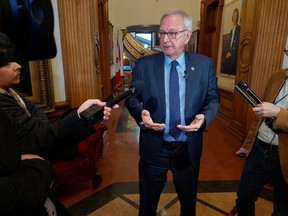Expert slams Higgs's comments on puberty blockers study
Researcher may have been trying to support her own thoughts, premier says

Article content
Premier Blaine Higgs says he didn’t distort the findings of a Canadian study about the availability of puberty blockers, but is suggesting that the researcher who did the work may have.
That’s sparked a stinging response, including that Higgs is “not interested in truly understanding what is happening in adolescent gender-affirming care in Canada.”
It’s the latest chapter in the premier’s “parental rights” crusade, and the government’s controversial changes to Policy 713, which sets gender rules in public schools.
Those changes will soon be challenged in court.
In an interview last month, Higgs told the Canadian Press that “about 60 per cent” of children questioning their gender identity “are given automatic affirmation and put on some sort of hormone therapy” after their first medical appointment.
After Higgs faced questions about where he found that percentage, the government made two experts available to speak to the media about puberty blockers, which are not connected with Policy 713 or parental rights.
One of the experts presented to the media, and who the government sought advice from, was clinical psychologist James Cantor. He’s notable for having testified in several U.S. states to uphold bans prohibiting trans students from participating in girls’ sports.
The premier’s 60 per cent figure was eventually attributed to Cantor’s presentation to the province, which in turn cited a 2021 study of Canadian children up to the age of 15 who had been referred to gender clinics for puberty blockers.
But the author of that 2021 study, Greta Bauer, said Cantor’s interpretation of her work was wrong. And she said the message Higgs is putting out publicly is “that adolescents can just walk into a clinic and walk out with a prescription for hormones.”
“It’s frustrating to see results of research misinterpreted, sometimes deliberately,” she said. “I think if one is going to claim that they are taking an evidence-based approach to policy, they need to make sure that they’ve got the evidence correct.”
Bauer told Brunswick News that while 62.4 per cent of children in the study were given hormones at their initial hormone appointment (where they might receive hormonal medication), they’d already seen on average 2.7 different types of medical providers and waited, on average, nine months.
Questioned about that, Cantor said Bauer’s answer “is an example of not the whole truth.”
Canada doesn’t have a mandatory waiting period nor mandatory assessment process for children questioning their gender identity before they receive puberty blockers, he said. While these surveyed children may have waited nine months for their initial hormone appointment, he claimed this is the result of it being “tough to get into the clinics” – not that children were being assessed and monitored during this time.
Last week, Higgs was asked why he chose not to speak to Bauer directly about her study.
“I would say it would be great if you did some research in Europe, and look at what’s happening in Europe, and understand (whether) we have similarities here that we should consider,” Higgs said.
“That’s what needs to go further, is understand what’s going on around us, not just look at our silo in New Brunswick. But what’s Europe doing, and what have they changed, what’s their policies, what have they found? There’s a lot more to this than … any singular study.
“Yes, there are two opposing opinions on that study. But I think what’s going on in Europe is something we need to understand.”
Brunswick News then asked Higgs why, if he’s focused on what’s happening in Europe, he had an expert make a presentation about a study that was done in Canada, with Canadian children. He was also asked about what Bauer said about Cantor’s interpretation of her work.
“There’s a difference of opinion … on the analysis of that report. You would certainly recognize that people can write reports that support their own thoughts. So the folks that have been involved in analyzing different reports around the world – and what’s going on in Europe – challenge that report,” he said.
On Monday, Brunswick News asked Bauer to respond to Higgs’s comments.
“Premier Higgs could have talked with New Brunswick physicians providing this type of medical care, or with health care providers from any of the specialist clinics in children’s hospitals and other health care centres across Canada, and he chose not to,” she said.
“He has chosen instead to rely on the interpretations and misinterpretations of a consultant-for-hire psychologist who does not treat trans adolescents nor conduct research on trans and non-binary health, and ignore the experiences of Canadian researchers, physicians, and psychologists with many years of professional experience in this area.
“This makes clear that he is not interested in truly understanding what is happening in adolescent gender-affirming care in Canada.”












Postmedia is committed to maintaining a lively but civil forum for discussion. Please keep comments relevant and respectful. Comments may take up to an hour to appear on the site. You will receive an email if there is a reply to your comment, an update to a thread you follow or if a user you follow comments. Visit our Community Guidelines for more information.